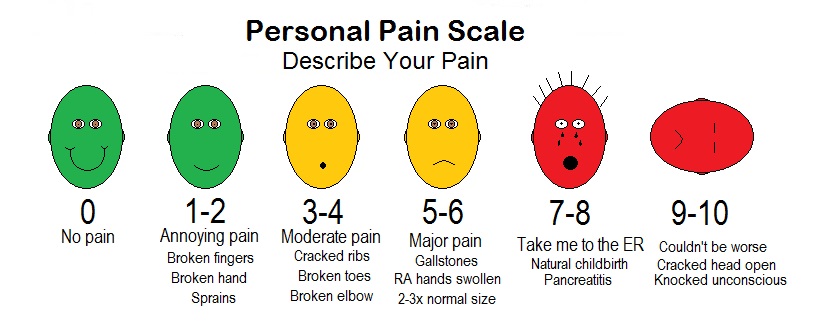blogs about awakening
|
No one, especially none of us pampered Americans, likes pain. While pain can warn us to quickly take our hand away from that hot stove to prevent deeper burning, it’s still not something we long for. Those who relish pain we call masochists.
Yet pain is an inescapable part of life. Not just the physical pain of stubbing our toes, jumping into a pool full of cold water or getting bit by an angry dog; but emotional and relational pain that, in some respects, can be more debilitating and even permanent if we let it. Given the choice, wouldn’t we all choose a pain-free existence? But should that be the case for us followers of Christ? Sure, we would love to grow into all God intends for us without pain. But students of the Bible know that because of our self-centered natures, we need pain to motivate us to mature in godliness. So, we are exhorted by Paul to “glory in our suffering” (Rom 5:3) and to delight in our weaknesses, insults, hardships, persecutions and difficulties. ( 2 Cor 12:10) James says we should “consider it pure joy” when we encounter painful trials. (James 1:2) Not because we are masochists, but because we know that pain is God’s way of helping our selfish characters grow more like Jesus’ selfless one. The author of Hebrews says that God disciplines those He loves and that no discipline is pleasant, but painful. (Heb 12:6,11) But what does it produce? “A harvest of righteousness and peace for those who have been trained by it.” (Heb 12:11) Consider the Biblical examples of Joseph and David who were unfairly treated by those around them, but all that pain produced in them persevering faith in God. A.W. Tozer put it this way, “It is doubtful whether God can bless a man greatly until He has hurt him deeply.” In Hebrews 12, we see Esau who demanded his hunger be satisfied now even if it meant foolishly selling his precious birthright to his younger brother Jacob. In contrast, consider Moses described in Hebrews 11 as being willing to suffer affliction with the people of God rather than enjoy the pleasures of sin for a season. Why did he do this if pain is our ultimate enemy and pleasure our ultimate friend? “He regarded disgrace for the sake of Christ as of greater value than the treasures of Egypt, because he was looking ahead to his reward.” (Heb 11:26) And that is the key! Not living for a short term benefit that is temporary, but for the long term, more permanent gain. We trust that God will reward us in the life to come. Jesus said that we should rejoice when we are mistreated for the cause of Christ because “great is your reward in heaven.” (Matt 5:12) There are promises like this all through Scripture. So, like an athlete training for the Olympics, or a musician practicing scales day after day, we choose to endure the pain of preparation for the goal of ultimate, certain reward. But what if your worldview says that this life on this planet is all you get? Then pain becomes our greatest enemy, because I simply must get all I can out of my 70 or 80 years of existence. So if you cause me pain, you owe me big time! This sort of thinking explains the rise of what people are calling the evil of “microaggressions.” A microaggression is defined as “a subtle but offensive comment or action directed at a minority or other nondominant group that often unintentionally or unconsciously reinforces a stereotype.” One example of a microaggression comes from the University of North Carolina’s Employee Forum which, among other transgressions, warned against complimenting a woman on her choice of footwear. Why? Because, “To do so would be considered to be a microaggression meaning ‘I notice how you look and dress more than I value your intellectual contributions. How you look is really more important.’” (I think I can hear a number of gasps from you who just read these words.) In any event, when we consider the pain that Jesus and His followers endured as they sought to obey God and demonstrate His love for us who would follow them, we need to have the attitude of Paul, who said, “Therefore I endure everything for the sake of the elect, that they too may obtain the salvation that is in Christ Jesus, with eternal glory.” (2 Timothy 2:10) Bottom line, while we do not choose suffering or pain, neither are we shocked when it comes our way in this world. And whether pain comes to us as loving discipline or to prompt our growth in character, we know it originates from the hand of our sovereign, loving Heavenly Father. He will surely give us the grace to be like Jesus, who kept His eyes on the joy set before Him and thereby was able to endure the cross. (Heb 12:2)
2 Comments
 What a grief to hear of the vicious, unprovoked attack last night on police officers in Dallas. As a former prosecuting attorney and trial court judge whose role brought me daily into close contact with law enforcement officers for years, I hurt for the brave police officers in our cities who need now to be ultra-alert as they daily continue to put their lives on the line to protect us all. I also hurt for their loved ones who must wonder if they will ever see daddy or mommy again as they walk out the door to their daily posts. Yes, it would appear some police officers have abused their authority and made deliberate or negligent choices that have resulted in deaths to otherwise innocent victims, some of which are African-American. These incidents are themselves tragic, but certainly do not justify the deliberate murder of men and women whose only connection to the errant cops is that they too wear a uniform and have a badge. To draw an analogy, it would be totally unjust to condemn every doctor as evil personified simply because we hear of one who abuses his position and carelessly or deliberately causes the premature death of a patient. Those who make wrong choices must bear their own punishment. And, beyond deliberate choices people make to hurt others, in the course of everyone’s life, there are honest mistakes that we all make! We put erasers on pencils for a reason! Yet it seems that the public demands total perfection in certain areas of life. I saw this reality repeatedly as a juvenile court judge concerning the system that dealt with child neglect and abuse. Often conditions in the child’s home required removal and placement in foster care. While the overwhelming majority of foster parents are wonderful caretakers, there are a few who are not. During my 15 years on the bench, I saw more than one case where we removed kids from their own neglectful or abusive homes, only to be neglected or even injured in the “licensed” foster home the system found for them. I also saw instances where caseworkers returned children to their natural parents only to have the kids suffer repeated abuse or even death at the hands of their parents. Needless to say, the public was furious in such cases: “Caseworkers must never make mistakes in licensing foster homes or in returning kids to parents!” Newsflash: caseworkers are human too. So enough of expecting 100 percent perfection from anyone in culture, including those in law enforcement. Excessive or repeated negligence must be responded to. But anyone who demands perfection from others needs to take a long look in the mirror and also seek the honest feedback of those around them, including their spouses. We all are in need of grace. So how can we defuse the racial animus that seems to be escalating in our nation? I’m confident there will be calls by city mayors and other officials for all the races to “come together and work together” to bring peace and harmony among different ethnicities. Sounds good, but will it work? Unfortunately, not very well. You see, if I continue to look at life through the eyes of how poorly “my people” have been treated by “your people,” I will never be satisfied until things are equal in my eyes. And even then, I’m going to feel you owe me for the past injustices against my people. Yes, maybe we can eke out a temporary truce of non-violence, but it can never engender true, unconditional love. There is and has always been only one answer: Jesus Christ breaking down the barriers and producing genuine love. How does that look? Let me offer a couple of true life illustrations. One is Otto Kelly, a tall, muscular former football player who I met in Reno. Otto is Black and a pastor. Otto gets how his race has been systematically subjugated by white people over the years. Yet he told me, “Consider that Jesus was willing to go to the home of a Roman centurion to heal his servant. That would be like a Jew going to help a Nazi General in World War II.” Otto continued, “If Jesus can do that, I can forgive and love my white brothers and sisters." "Forgiveness,” he said, "is not a feeling; it's a choice to obey God." Jesus commanded us not just to love our neighbors, but to love our enemies! That is precisely what Otto has chosen to do, and he gets the power of God to do it wholeheartedly. I love this brother and am so proud of him! The other illustration is one very close to me. The highlight of my week is being part of a prayer group that formed only about nine months ago. While it continues to grow, it now consists of a dozen or so white, black, and Latino men who are pastors and ministry leaders. A year ago, few of us knew anyone else who is now in the group. Yet despite being relatively new brothers in Christ we genuinely love each other. And we love to be together. I am convinced these men would literally die for me if need be, and I for them. The only way to explain this bond we all feel is that we are true blood brothers, a reality that far transcends race, ethnicity or background. We have all been bought by the blood of our big brother Jesus Christ and been adopted into God’s family. As I write this I am choking back tears of gratitude for these men who are so precious to me. God has done this and longs to do this more and more in our days. Jesus prayed for this sort of unity the day before He went to the cross. Let’s not frustrate His prayer. Listen: “My prayer is not for them alone. I pray also for those who will believe in me through their message, that all of them may be one, Father, just as you are in me and I am in you. May they also be in us so that the world may believe that you have sent me. I have given them the glory that you gave me, that they may be one as we are one— I in them and you in me--so that they may be brought to complete unity. Then the world will know that you sent me and have loved them even as you have loved me.” (John 17:20-23) |
Randy HekmanHe is the executive director of The Grand Awakening. Archives
July 2024
Categories |

 RSS Feed
RSS Feed
